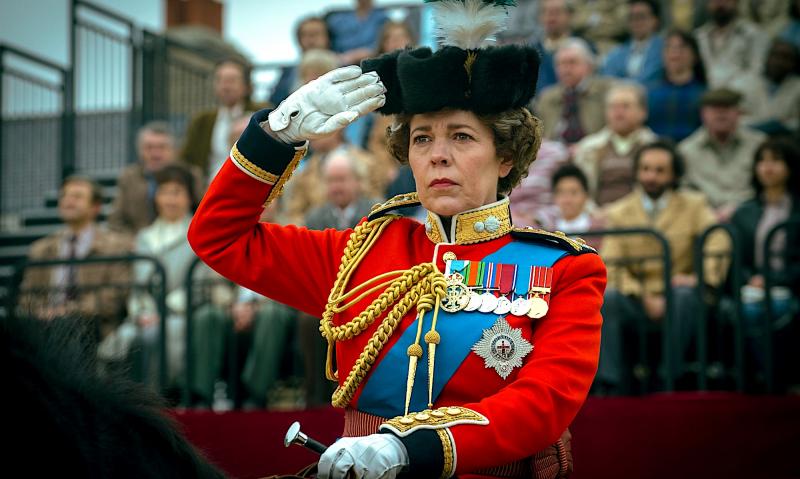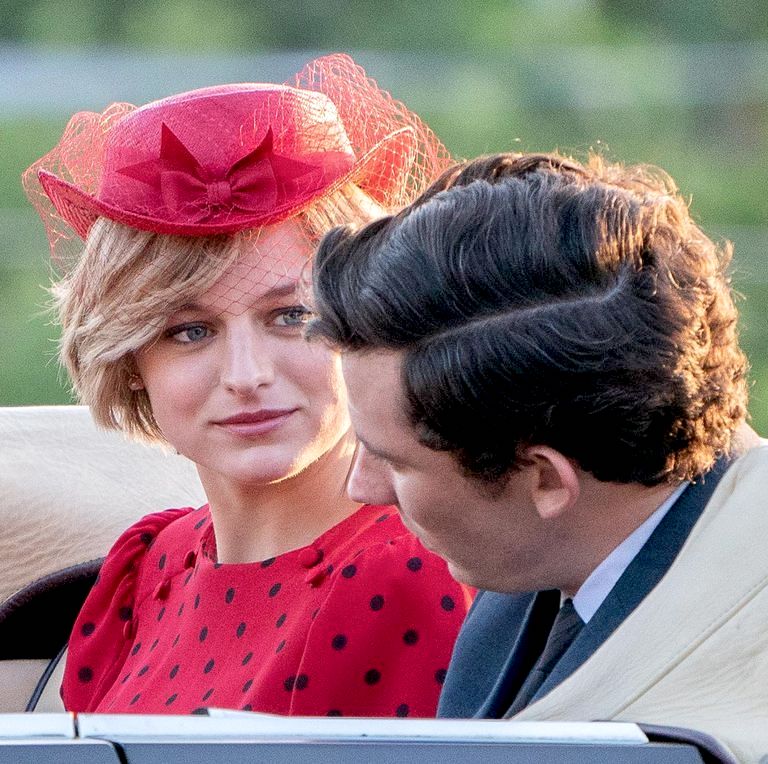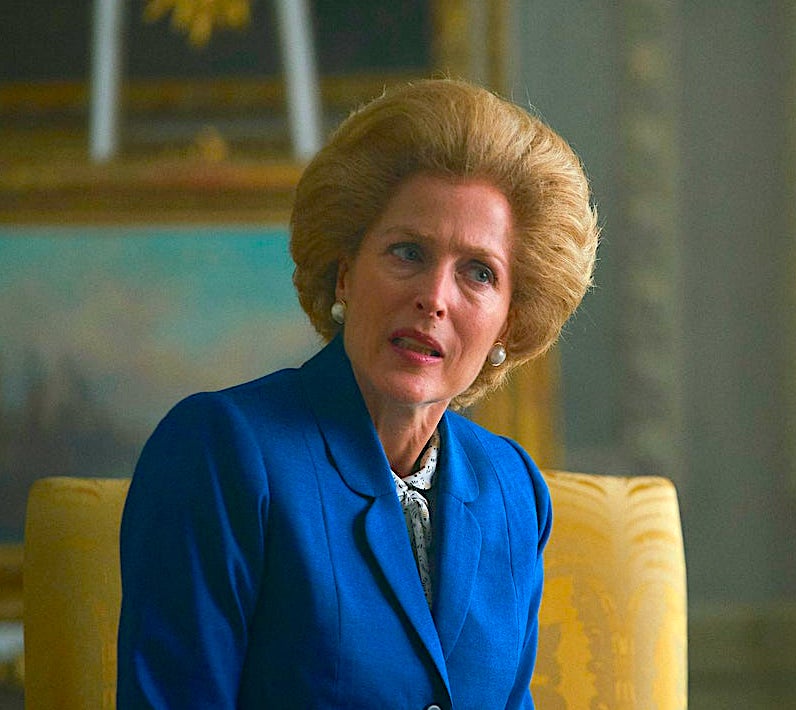The Crown, Season 4, Netflix review - royalty rocked by personal and political turbulence | reviews, news & interviews
The Crown, Season 4, Netflix review - royalty rocked by personal and political turbulence
The Crown, Season 4, Netflix review - royalty rocked by personal and political turbulence
Princess Diana and Margaret Thatcher steal the limelight

Pre-release excitement about the fourth coming of The Crown (Netflix) has centred on Emma Corrin’s portrayal of Princess Diana, still big box-office 23 years after her death.
The shocking murder of Louis Mountbatten by an IRA bomb in the opening episode notwithstanding, it’s the calamitous progress of the marriage of Charles and Diana which provides much of the dramatic impetus for this new series, as it traces its trajectory from the day when the skittish teenaged Diana “accidentally” met the Prince when he was visiting her older sister, through the royal family’s decision that Charles should marry Diana and be quick about it, to the disintegration of their union on the twin rocks of Charles’s obsession with Camilla and Diana’s effortless talent for upstaging Charles everywhere they went. We see her turning a potentially catastrophic tour of Australia, which had just elected the stridently republican prime minister Bob Hawke, into a fairytale-like popular triumph, while her solo visit to New York in 1989 (with Manchester standing in here for Brooklyn) laid the foundations for her spectacular solo career in the Land of the Free.
 Yet dazzling as all this is – though perhaps not in the case of Charles (Josh O’Connor, pictured left with Corrin), who is unsparingly portrayed as petulant, weak, vindictive and self-centred – it’s the arrival of Margaret Thatcher in writer Peter Morgan’s sights that gives the series real bite. One of Morgan’s favourite devices is twinning characters or viewpoints, for instance the recurring example of the dutiful Queen’s relationship with her frustrated and hard-drinking sister Margaret. The Charles and Diana pairing is contrasted with Thatcher’s prickly yet grudgingly respectful relationship with the Queen, with the sovereign deploring the PM’s apparent lack of compassion yet bound to respect her force of personality and capacity for commanding the all-male grandees of the Tory party. “I’ve found women in general tend not to be suited to high office,” Thatcher opines. "They become too emotional." “I don’t think you’ll have that trouble with me,” Olivia Colman’s Queen retorts tartly.
Yet dazzling as all this is – though perhaps not in the case of Charles (Josh O’Connor, pictured left with Corrin), who is unsparingly portrayed as petulant, weak, vindictive and self-centred – it’s the arrival of Margaret Thatcher in writer Peter Morgan’s sights that gives the series real bite. One of Morgan’s favourite devices is twinning characters or viewpoints, for instance the recurring example of the dutiful Queen’s relationship with her frustrated and hard-drinking sister Margaret. The Charles and Diana pairing is contrasted with Thatcher’s prickly yet grudgingly respectful relationship with the Queen, with the sovereign deploring the PM’s apparent lack of compassion yet bound to respect her force of personality and capacity for commanding the all-male grandees of the Tory party. “I’ve found women in general tend not to be suited to high office,” Thatcher opines. "They become too emotional." “I don’t think you’ll have that trouble with me,” Olivia Colman’s Queen retorts tartly.
Morgan recognises Thatcher as a revolutionary iconoclast, driving a bulldozer though the decrepit dead wood of her cabinet (“unimaginative, cautious and wet” she snorts). Not too subtly, Morgan contrasts the evisceration of her political colleagues with the royal culling of a wounded deer (the royals’ fondness for slaughtering animals becomes actively repugnant in this series). But the lifestyles of Thatcher the workaholic and devoutly religious grocer’s daughter and the incomprehensible hereditary antics of the royal family are counterpointed to sometimes hilarious effect, especially in episode 2, when Denis and Margaret Thatcher are invited to join the Royals at Balmoral.
In Alan Bennett-ish scenes, the Thatchers arrive wholly unprepared for what’s in store (though this must surely be one of Morgan’s more absurd flights of fancy), prompting the spectacle of the Prime Minister trying to stalk deer across boggy mountainsides wearing a formal blue dress and court shoes. It’s faux pas city as Denis (a very wry Stephen Boxer) gauchely tries to tip the help and the Thatchers descend prematurely in dinner dress at 6pm, prompting the scorn of their hosts. In the evening, Mrs T tries gamely to join in the family’s idiotic parlour games, forced to utter gibberish like “calling number 10 ibble-dibble with six dibble-ibbles”. Denis’s description of the royals as “boorish, snobbish and rude” seems heroically restrained.
 Many actresses have essayed Mrs Thatcher, but her biographer Charles Moore is surely correct in his assertion that Gillian Anderson’s performance here is the most convincing yet. Anderson (pictured right) has nailed every fine detail, from the lopsided yet menacing walk to the steely, trance-like “I will not be interrupted” voice to the lip-biting tic and the power-hair. Morgan also manages to smuggle some pathos into his characterisation, when Thatcher is ousted from power and especially when her son Mark is feared dead on the Paris-Dakar Rally. This gives Morgan the opportunity for a riff on mothers-and-sons. Thatcher frankly declares Mark to be her favourite child, while a bantering Prince Philip (Tobias Menzies, continuing his brilliant form from series 3) teases the flustered Queen into admitting that Andrew is her own favourite.
Many actresses have essayed Mrs Thatcher, but her biographer Charles Moore is surely correct in his assertion that Gillian Anderson’s performance here is the most convincing yet. Anderson (pictured right) has nailed every fine detail, from the lopsided yet menacing walk to the steely, trance-like “I will not be interrupted” voice to the lip-biting tic and the power-hair. Morgan also manages to smuggle some pathos into his characterisation, when Thatcher is ousted from power and especially when her son Mark is feared dead on the Paris-Dakar Rally. This gives Morgan the opportunity for a riff on mothers-and-sons. Thatcher frankly declares Mark to be her favourite child, while a bantering Prince Philip (Tobias Menzies, continuing his brilliant form from series 3) teases the flustered Queen into admitting that Andrew is her own favourite.
It may be the way The Crown is edging closer to the present day that prompts some missteps as the series wears on, with the proximity of real events breaking through Morgan’s fictional sleights of hand. A whole episode is unconvincingly devoted to the strange episode of unemployed painter and decorator Michael Fagan breaking into the Queen’s bedroom at Buckingham Palace, with Morgan trying to turn it into a kind of Play for Today about social deprivation in the era of Thatcherite spending cuts. Episode 7 addresses the scandal of the Queen’s cousins Nerissa and Katherine Bowes-Lyon, hidden away for decades in a Surrey asylum. It’s a horrific story, but the use of what seem to be real hospital patients amid The Crown’s fictional framework strikes a jarring note. How they approach series 5 and 6 will be intriguing.
- Season 4 of The Crown is available on Netflix from 15 November
- More TV reviews on theartsdesk
The future of Arts Journalism
You can stop theartsdesk.com closing!
We urgently need financing to survive. Our fundraising drive has thus far raised £49,000 but we need to reach £100,000 or we will be forced to close. Please contribute here: https://gofund.me/c3f6033d
And if you can forward this information to anyone who might assist, we’d be grateful.

Subscribe to theartsdesk.com
Thank you for continuing to read our work on theartsdesk.com. For unlimited access to every article in its entirety, including our archive of more than 15,000 pieces, we're asking for £5 per month or £40 per year. We feel it's a very good deal, and hope you do too.
To take a subscription now simply click here.
And if you're looking for that extra gift for a friend or family member, why not treat them to a theartsdesk.com gift subscription?
more TV
 Blu-ray: The Sweeney - Series One
Influential and entertaining 1970s police drama, handsomely restored
Blu-ray: The Sweeney - Series One
Influential and entertaining 1970s police drama, handsomely restored
 I Fought the Law, ITVX review - how an 800-year-old law was challenged and changed
Sheridan Smith's raw performance dominates ITV's new docudrama about injustice
I Fought the Law, ITVX review - how an 800-year-old law was challenged and changed
Sheridan Smith's raw performance dominates ITV's new docudrama about injustice
 The Paper, Sky Max review - a spinoff of the US Office worth waiting 20 years for
Perfectly judged recycling of the original's key elements, with a star turn at its heart
The Paper, Sky Max review - a spinoff of the US Office worth waiting 20 years for
Perfectly judged recycling of the original's key elements, with a star turn at its heart
 The Guest, BBC One review - be careful what you wish for
A terrific Eve Myles stars in addictive Welsh mystery
The Guest, BBC One review - be careful what you wish for
A terrific Eve Myles stars in addictive Welsh mystery
 theartsdesk Q&A: Suranne Jones on 'Hostage', power pants and politics
The star and producer talks about taking on the role of Prime Minister, wearing high heels and living in the public eye
theartsdesk Q&A: Suranne Jones on 'Hostage', power pants and politics
The star and producer talks about taking on the role of Prime Minister, wearing high heels and living in the public eye
 King & Conqueror, BBC One review - not many kicks in 1066
Turgid medieval drama leaves viewers in the dark
King & Conqueror, BBC One review - not many kicks in 1066
Turgid medieval drama leaves viewers in the dark
 Hostage, Netflix review - entente not-too-cordiale
Suranne Jones and Julie Delpy cross swords in confused political drama
Hostage, Netflix review - entente not-too-cordiale
Suranne Jones and Julie Delpy cross swords in confused political drama
 In Flight, Channel 4 review - drugs, thugs and Bulgarian gangsters
Katherine Kelly's flight attendant is battling a sea of troubles
In Flight, Channel 4 review - drugs, thugs and Bulgarian gangsters
Katherine Kelly's flight attendant is battling a sea of troubles
 Alien: Earth, Disney+ review - was this interstellar journey really necessary?
Noah Hawley's lavish sci-fi series brings Ridley Scott's monster back home
Alien: Earth, Disney+ review - was this interstellar journey really necessary?
Noah Hawley's lavish sci-fi series brings Ridley Scott's monster back home
 The Count of Monte Cristo, U&Drama review - silly telly for the silly season
Umpteenth incarnation of the Alexandre Dumas novel is no better than it should be
The Count of Monte Cristo, U&Drama review - silly telly for the silly season
Umpteenth incarnation of the Alexandre Dumas novel is no better than it should be
 The Narrow Road to the Deep North, BBC One review - love, death and hell on the Burma railway
Richard Flanagan's prize-winning novel becomes a gruelling TV series
The Narrow Road to the Deep North, BBC One review - love, death and hell on the Burma railway
Richard Flanagan's prize-winning novel becomes a gruelling TV series
 The Waterfront, Netflix review - fish, drugs and rock'n'roll
Kevin Williamson's Carolinas crime saga makes addictive viewing
The Waterfront, Netflix review - fish, drugs and rock'n'roll
Kevin Williamson's Carolinas crime saga makes addictive viewing

Add comment